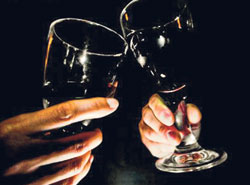Alcohol provides pleasure for many, but it may also be the root cause for many health problems. The detrimental effects of alcohol have come to light in recent years due to increased consumption among young people. The Western culture of socializing with a glass or two of your favourite tipple is gradually spreading to developing countries. Bars and public houses being open for longer and alcohol becoming more and more affordable has increased availability and thereby increased uncontrolled drinking amongst youngsters in the Western world.
In Sri Lanka, the culture of drinking takes on a different pattern, although this too is changing. Drinking in general is mainly by men and the tipple is hard liquor such as whisky. In rural areas, ‘home brews’ sold illegally are also consumed and the percentage alcohol content in these is difficult to ascertain. There is a culture of binge drinking, rather than little and often.
As we approach the festive season when alcohol will flow in abundance, being aware of its good (yes there are some beneficial effects!) and bad effects will enable us to enjoy the festivities without detrimental effects.
What is alcohol?
Alcohol is formed by the fermentation of glucose by yeast. The alcohol content of the drink is determined by the length of this process and the amount of yeast. Wines can be made by the fermentation of fruits and vegetables and beer from barley and rye.
What are the recommended amounts?
In the UK the recommendations according to the health governing bodies is no more than two to three units of alcohol a day for women and three to four units for men, with at least two or three alcohol-free days each week. The key is moderation.
How are units calculated?
Establish the strength of the drink (% ABV) and amount of liquid in millilitres (one pint is 568ml; a standard glass of wine is 175ml). Multiply the amount of drink in millilitres by the percentage ABV, and then divide by 1,000. For example, 175ml wine at 13% ABV: 175 X 13/1000 = 2.3 units.
Benefits
- Alcohol when taken in moderation reduces the risk of heart disease. This is seen in Mediterranean countries where a diet of fruit and vegetables with wine had indicated a reduced incidence of heart disease. It is thought that moderate alcohol intake raises the ‘good’ cholesterol concentrations in the blood, there by reducing the risk of blood clots and damage to the lining of the blood vessels.
- The buildup of fat in the inner walls of the arteries is also thought to be reduced by red wine, although this may also be achieved by drinking a glass of non-alcoholic grape juice!
Risks
- Chronic alcohol use causes significant damage to the liver. This damage is irreversible and will have an impact on liver functions. Have you ever felt a sharp pain under the ribs on the right side after a particularly bad bout of drinking? This is caused by the inflammation of the liver. Decreasing the amount consumed can decrease further damage.
- Changes in mood:This can be very significant. Although there is a sense of euphoria initially, alcohol is known more for its depressant nature. Suicide rates are higher amongst chronic alcohol uses.
- Stomach ulcers and damage to the lining of the oesophagus: Can cause catastrophic bleeding
- Fertility problems: Women who drink in excess have low rates of conceiving. And there is also a significant effect on male fertility.
- Weight gain with its associated risks to health.
- Rise in blood pressure and increase in coronary artery disease.
- Alcohol is also thought to increase the risk of developing certain cancers such as, oral, larynx, stomach, colon and breast cancer.
- Brain damage: Can cause problems in memory initially and go on to cause dementias.
- Risk to your life and others: Alcohol even in small amounts can reduce coordination, slow reflexes and lead to over-confidence. With alcohol on board users will feel indestructible. Driving fatalities caused by drunk drivers is on the increase. This is a major cause of deaths on the road.
- Finally alcohol used habitually has a major effect on the productivity of the person. Moreover, it have an impact on the social wellbeing of the person and his family, when there is loss of work and financial support.
So this festive season, enjoy your tipple if you must, but only in moderation, be safe and be healthy. Forget ‘one for the road’ and take a taxi home. Merry Christmas and a happy new year!
|

